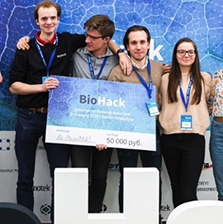
The third place – and a prize of 50,000 rubles – went to the team No PasaRAN!, made up of students from ITMO University SCAMT lab., St. Petersburg State University, St. Petersburg Polytechnic University and the Bonch-Bruevich University of Telecommunications. As ZaalLianov, head of EPAM’s training center in St. Petersburg, noted, the team employed high-performance computation and data optimization successfully, and managed to find a simple and effective solution to their task.
The project required them to create a model that would be used to predict the development of a neurodegenerative disease based on the analysis of repeat genetic sequences. These repeat sequences are cause of the RAN-translation process, which produces proteins containing certain amino acid sequences. These proteins, in turn, are involved in the formation of particular substances that are associated with neurodegenerative diseases. In addition, the number of repeat genetic sequences is known to correlate to the rate of disease contraction.
The team’s task was to use an existing set of big data to analyze the presence of repeat sequences in the genomes of healthy patients and those suffering from neurodegenerative diseases. Based on the results, they were to use a neural network and machine learning to build a predictive model for such disease. The result model reproduces the results acquired by scientists through experimental methods. Students note, however, that the model cannot produce 100% correct predictions. First of all, there is still very little data on RAN-translation and its effect on disease – less than 10 articles on the topic exist. Second of all, the repeat sequences that precede a disease are not always the same.
“The mechanics of this have not been studied well yet. To understand where we can find a RAN-translation, we tried to compile all the knowledge acquired by the authors of several existing articles and then predict which genes, theoretically, might present us with the right conditions. Then, scientists can verify our predictions with experiments. BioHack is a great place to try to quickly check something that you’re concerned with but just don’t have the time: here, you have people from different fields working together,” – comments Dmitry Smirnov, ITMO student and member of team NoPasaRan.
(author Natalia Blinnikova)